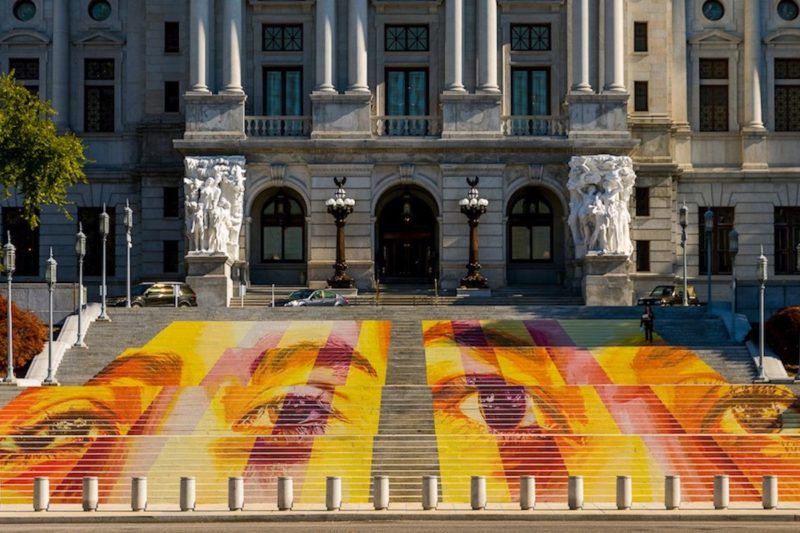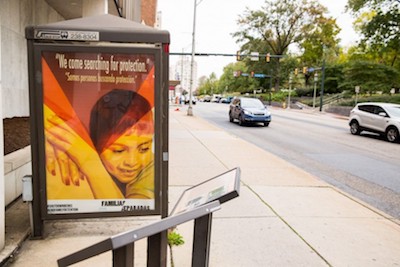Pennsylvania Mural Highlights Migrants Who Were Traumatized in ‘Family Prison’
Members of the Shut Down Berks Coalition will join the muralist in Harrisburg today for a rally to close the detention facility. The art project comes just as President Trump moves to hold asylum seekers in “massive cities of tents."

Karen (a pseudonym) struggled to comfort her then-5-year-old son after he twice attempted suicide during the 651 days they were held in detention, while seeking asylum from extreme violence in El Salvador.
“What would you tell your son if he asked, ‘Why can’t I be free?’” she once demanded to know from a guard at the Berks County Residential Center.
The trauma they endured there was hard to ignore this week when their eyes—and her son’s question—were painted in an 88-foot mural across the steps of Pennsylvania’s capitol building in Harrisburg, about an hour’s drive from Berks. The massive image is part of a citywide art project that includes several billboards and three bus shelter displays featuring the images and words of parents and children who were held at the controversial facility.
“It is not a safe house, it is a family prison,” reads one bus stop display.
The installations were unveiled just as President Trump announced new plans to hold asylum seekers in “massive cities of tents” while their cases wind through the courts, and human rights advocates are ramping up calls for Gov. Tom Wolf (D) to shut down Berks while its license to operate is reviewed.
Senate Majority Pro Tempore Joe Scarnati (R) issued a statement calling the mural “inappropriate,” especially “two weeks leading up to an election.”
But the state’s Department of General Services said it approved the mural under “normal procedures” for the capitol complex, which regularly hosts events, including rallies for political candidates. In any case, now seems like the perfect moment for the mothers to be able to share how they were affected by their indefinite detention.
“I think I’ve overcome most of it,” Karen told the award-winning muralist Michelle Angela Ortiz in an interview shared with Rewire.News that will also be posted online to accompany the mural. “At the same time, you can’t really get over something like that.”
Ortiz visited 14 families at Berks from March to August in 2017 and said she was inspired by seeing the mothers go on work and hunger strikes to push for their freedom. After ten of the families were deported, and others were released with ankle monitors, she stayed connected with several of families in the United States, and Karen in El Salvador. Their ordeal is now the focus of her public art project called “Familias Separadas,” which is the Spanish term for broken or separated families.
“This is about shifting perspectives, Ortiz said. “The power of the image is really necessary at this point to help people stop and react and then think about what is happening.”
For nearly two years, the government refused to free the 14 families from Berks while they argued that their asylum hearings were unfair and appealed in federal court for a judge order new hearings. Ultimately, the U.S. Supreme Court declined to decide whether their right to due process was violated.
“I think the case remains relevant as the Trump administration appears ready to lock up families for long periods of time,” said Lee Gelernt, the American Civil Liberties Union lawyer who led the challenge and now spearheads the ACLU’s lawsuit that is forcing the government to reunite the families it separated at the U.S.-Mexico border.
Gelernt says the Berks case also showed the need for federal courts to have oversight of truncated asylum reviews “that we believe are unfair and produce erroneous outcomes.”

Ortiz believes the Berks families she spoke to are “very much like other asylum seekers” headed north from Honduras, El Salvador, and Guatemala, including those in the much-maligned caravan. Once these new asylees reach the U.S. border they could be sent to Berks, or kept at one of two massive detention centers in Texas that together can hold nearly 3,500 people.
She partnered on the project with the Shut Down Berks Coalition, which is leading a campaign to close the facility based on concern about poor conditions, including inadequate health care and protection from sexual assault by guards. In 2016 and 2017, Pennsylvania’s Department of Human Services responded by refusing to renew the license for Berks to operate. But Berks county, which runs the jail under a $1.3 million contact with Immigration and Customs Enforcement, appealed the decision. The case is now bogged down in bureaucratic proceedings.
Wolf’s office said in a statement that it “has already attempted to revoke the license.” In recent weeks the coalition has ramped up pressure with sit-ins at his offices, calling on him to issue an emergency removal order to close Berks while the appeal continues.
“The governor keeps saying he can’t do anything until this matter is resolved, and that is not true,” said David Bennion, an immigration attorney who is director of the Free Migration Project, which has challenged Berks’ license with other legal advocates like Aldea and the National Immigration Project of the National Lawyers Guild. “We tried to intervene because they have not been carrying out their duties with regard to caring for and protecting the children there.”
Members of the coalition will join Ortiz in Harrisburg today for a rally to close Berks, and read testimonials from detained families who are featured in her project’s installations. The project will remain on view through November 18.
“Pennsylvania should set an example by shutting down Berks and really challenging what is happening to immigrants,” Ortiz says. “This is an opportunity to do that.”

